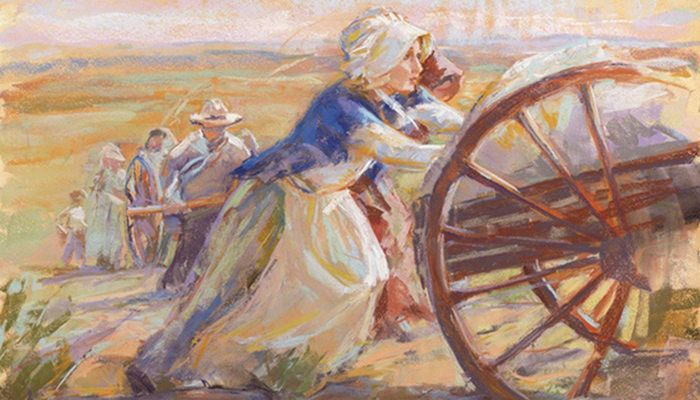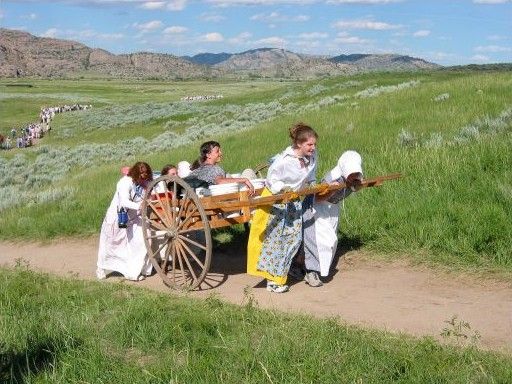I arose on Saturday morning after a night of many awakenings; my mind wandered to a holy landmark. It had been nearly two weeks since my husband had surgery to remove a benign brain tumor. At 16 years old I traveled with the youth from my stake on a journey to remember our pioneer ancestors.
Pioneer Sheroes
Early Mormon saints were driven out of their homes and land by extermination order in Missouri, and then again in Illinois. They were murdered, women were pillaged, and the Prophet Joseph was dead.
Expelled from the safety of shelter, they were barren and desolate. First across the great Missouri River, on the threshold of winter’s crystal grasp, then onto the muddy and miserable Winter Quarters. Miracles ennobled the desperate saints, and through the gifts, they lived, at least some of them.
The next season brought a new goal – reaching the hidden valley, what soon would be an Ensign to the nations, even the great Salt Lake.
And yet, for many men, counted at 500 and a handful of women, as requested by United States President James Polk for the Mexican War, their journey wouldn’t be alongside their wives and children, but as soldiers, to show loyalty to the country that allowed the extermination of its people.
The Mormon Battalion’s march started in Council Bluffs, Iowa on July 20, 1846. The 1,850-mile journey took them across the country to San Diego, California, and back to their families, who had, at that time arrived in Salt Lake in the summer of 1847.

The wives of those soldiers bore a heavy toll – first to survive the death fest of disease through a long and grueling winter, and then to make a solo journey across the plains with the Saints to the Salt Lake Valley. Their sacrifice to live and love through adversity gives me great strength to endure my trials, even those that may seem trivial in comparison.
Modern Day Pioneer Trek – Women’s Pull
When we replicated this experience at Pioneer Trek, there were several hundred teens and adults. We used a large handcart to pull provisions for our family of about 12. Youth from our stake included both boys and girls, and a Ma & Pa. On the end of the first day, after we had completed 7-8 miles of our intended 14-miles, we were coming up on the hardest part of our journey. There was a long, steep incline, while my memory has faded, I imagine that this section of the trail was close to a mile forge up a rocky, dry, hot slope.

Both the men and women, girls and boys, experienced in a small way the trial of separation. Leaders instructed the young men not to talk, while they could help if they chose, they could not touch the handcart. At first, it was merely a game, as the boys enjoyed taking a break from the hot and slow hike. The girls mustered their courage and looked ahead at the daunting task; make it to the top of the biggest hill with half the numbers from their family.
The handcart was full; we carried our food, tarps, water, spare clothes and a few tools. We all took a station; some at the front pulling a large rope, that was tied to both ends of the handlebar, giving more room for more people to carry the weight. Two girls were at the crown of the cart, pushing the wooden handlebar, and several were at the back, myself included, pushing from behind.
The fun started wearing off for the silent brood of teenagers. For the young women, the climb was difficult; it was trying. The boys began to appreciate the contribution they willingly would have given if they could have.
The August sun beat down on the dry sage brush land. Sweat poured from my brow, and fell graciously and without interruption from my hand because I could not afford to let go of my post.
In near panic, the boys began looking past what they could not do to help and started looking at what they could do. For some, it was their first lesson in what it means to be on an angel’s errand.
A nearby stream inspired one young man to gather the dust graced handkerchiefs from the ladies, and dip them in the cold water. Once redistributed, they provided relief to the furrowed brows of our female pioneer champions.
Another boy, I don’t even know who, gathered a bouquet of wildflowers and strategically set the hearty collection inside the cart, right at my sight’s view.
In desperation to help, a teenager placed his hands on the small of my back and pushed with all his might to provide strength and support. From the front, several boys grabbed a hand of one of the girls and pulled her along.
Cheers could be heard in the distance, as the first of our handcart train reached the top of the mountain. And then, as they finished their trial, the strong girls headed back down to hill to help those families who were struggling. That day I realized some important lessons.
- Women are strong, we can do hard things, but Heavenly Father did not intend that we work alone.
- Men fill the calling of their potential, especially when they see how much their strength is needed.
- Together, in unity is how we make it to the top of the mountains we face.
- I love flowers, God’s beauty is the perfect reminder of the beauty of feminity, even when I am required to pull the burden designed for men.
Today’s Equivalent
As I was reminded of my pioneer ancestors and my memory of empathizing with their plight, I relate to the journey of a solo wife, with an angel husband.
If our modern-day life including our four children, our business, and our home were all paralleled into a pioneer experience, it is as if our whole existence is in a hand cart that we need to push across the mountain pass. Usually, my husband & I pull our cart together. We depend on each other; we help each other. Because of his surgery, he is unable to help right now. His job is to rest and to heal.
I do not want my record of our trials to resemble complaining, and I acknowledge that my comparison to the pioneers may undermine the difficulties of their sacrifice. However, I also want to record the reality of this experience, in truth. I am carrying a heavy load of responsibility, not unlike many others such as single mothers, divorced families, and others who have faced health challenges either for a season or a lifetime with their companion.
I arise on most days before or with the sun and work until I collapse late into the night. I work to provide a living; I work to create a happy sanctuary for our children. I work to feel God’s love, and to fill my soul with heaven’s grace, through communion and study. While my brow is heavy laden with the heat of adversity, my mate is not long gone, away at battle. He is battling, at my side. He is fighting for his health, for freedom from mind-boggling pain. He is fighting for the protection against Satan’s minions who generously attempt to shred his self-worth and value as a provider, seeing as he is prevented now from pushing our cart.
In his desperation to help, as he sees me toil, our souls are tied together eternally in mutual affection and concern. He gently caresses my cheek and whispers words of thanks. He acknowledges my sacrifice and at times feels the weight of my worry.
Before we went to the hospital, he made arrangements for flowers to be delivered to the waiting room during his scheduled 8-10 hour surgery. Included in the petite bouquet were Gerber daisies. Which happen to be the flowers I chose for my wedding bouquet. Flowers are the perfect reminder of my feminity in facing and pulling what should be required of two.
During testimony meeting at Pioneer Trek a member of our stake presidency, President Oscar McConkie said something to the effect of, “If we want to be able to go where the pioneers are now, we have to be willing to go through what they did then.” Little did I know twenty-two years ago that our Rocky Mountain summit would be a season of enduring and recovering from a potentially devastating medical diagnosis.
I am grateful for my pioneer ancestors, and for the week I had over two decades ago to walk briefly in their shoes. Their experiences give me hope and encouragement to face my challenges with as much courage and faith as they did, and in the process, too, come to know God.

